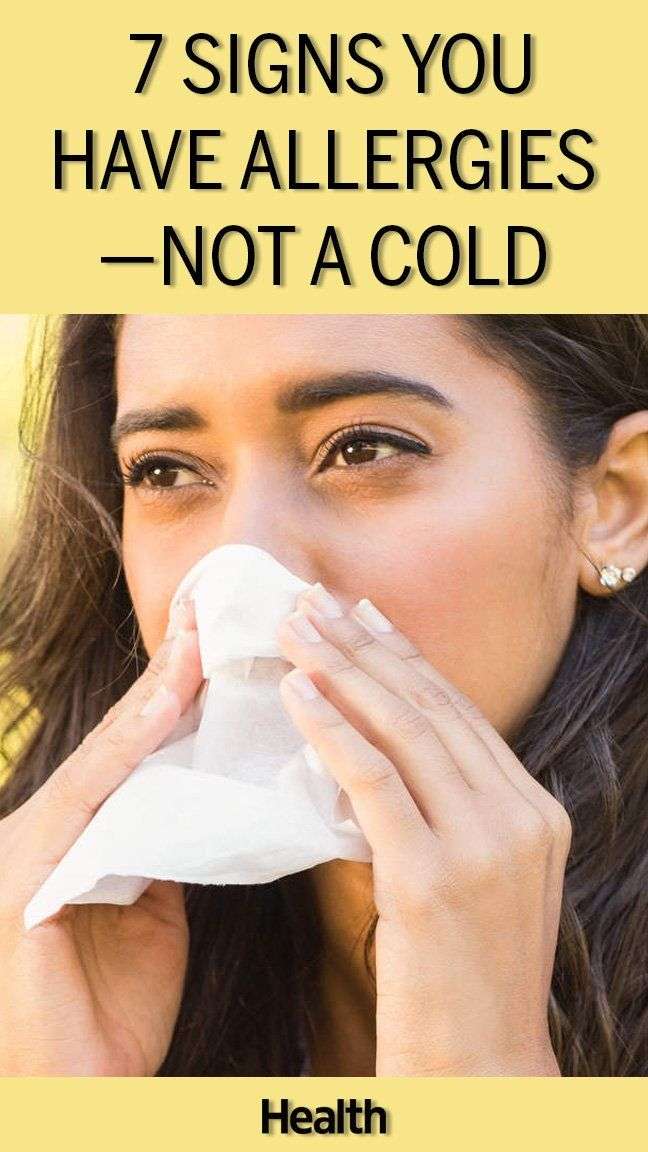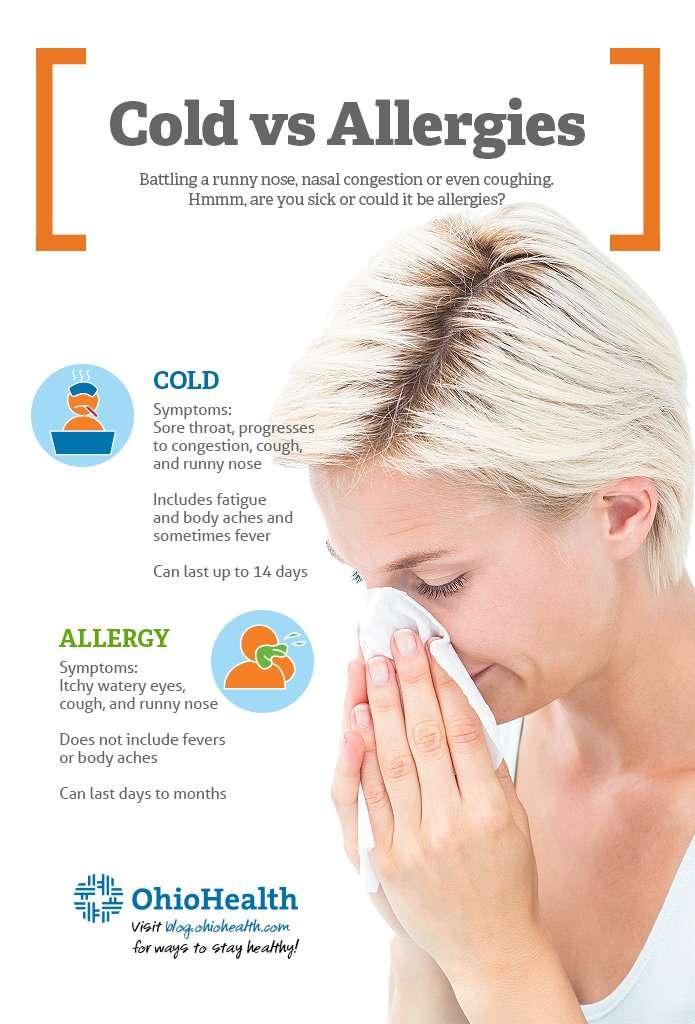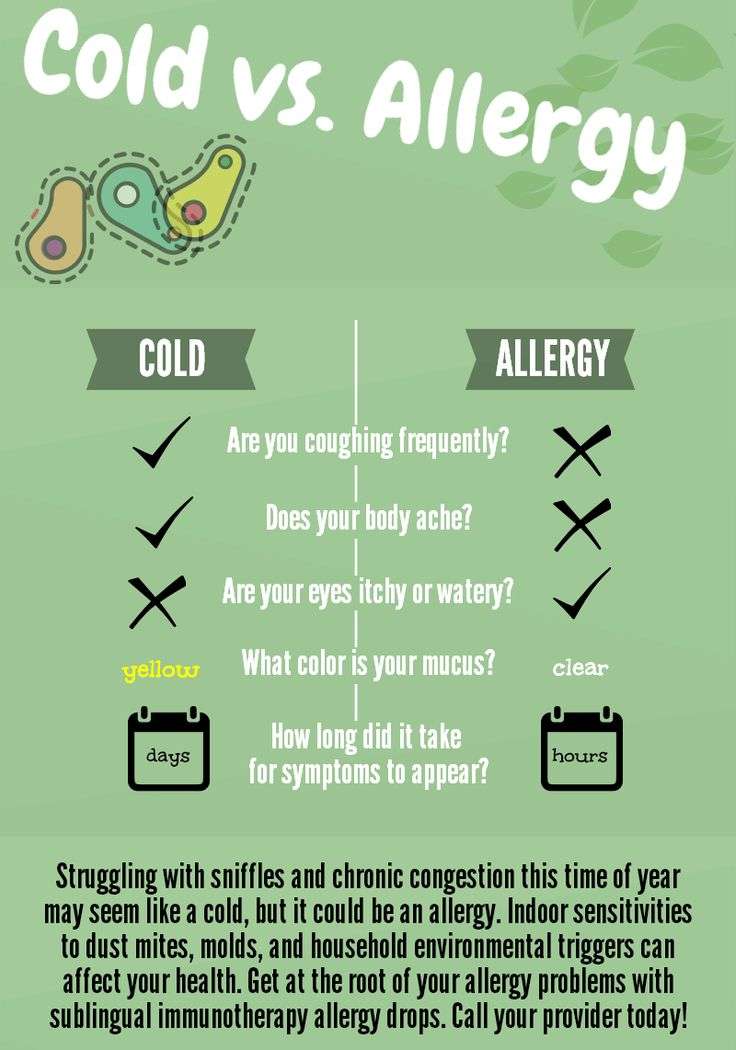How Are Allergy Symptoms Different From Covid
There is some overlap between allergy and COVID-19 symptoms. Common symptoms of allergies include runny nose, sneezing, puffy eyelids, congestion and post-nasal drip. So how can you tell the difference?
People with allergies often have a history of them, and the same triggers will cause their symptoms.
Another clue you have allergies and not COVID-19 is that you feel better after taking allergy medication, such as an antihistamine and decongestant. While some medication might improve your symptoms from COVID-19, you won’t really be cured until your body clears the virus.
Itchiness in the eyes, nose, ears or throat can be a big symptom of seasonal allergies but isn’t common with COVID-19, according to Emerson Hospital. Less commonly, viruses like COVID-19 can lead to conjunctivitis, which involves red, watery and itchy eyes. But eye itchiness from allergies is usually more intense, and it responds to over-the-counter treatments, while viral conjunctivitis does not, Healthline reported.
On the flip side, fever, chills, muscle and body aches, nausea and diarrhea are all symptoms of COVID-19 which aren’t typically seen as allergy symptoms, allergist Dr. Sara Narayan said on a podcast posted by Emerson Hospital.
Cold Vs Allergies: Common Symptoms
Now that you know the three main differences, it’s time to look at the commonalities between the common cold and allergies. These symptoms include:
- A runny nose, nasal congestion, or nasal discharge
- Low energy
- Shortness of breath
These symptoms all link to colds and allergies, but they can present differently depending on their cause. For example, a persistent cough is not usually an indication of allergies. While allergies can cause you to wheeze, the condition is typically more intermittent than constant. If you’re coughing a lot, your respiratory system may have an infection. Get some rest, drink lots of water, and take decongestants while your immune system fights to restore your health.
Here’s one thing you can do at home to tell the difference between a cold and allergies:
- Check your mucus. While it may be unpleasant to blow your nose or cough into a tissue and then examine what came out, it can give you some insight. Allergies typically produce clear mucus, as allergens irritate the nose and throat without causing infection. A cold causes mucus to thicken and turn yellow or green as your body fights the infection. If the mucus is clear, an over-the-counter nasal spray or nasal steroid spray can help.
If you’re still unsure, and if symptoms get worse or don’t improve in five days, see your healthcare provider for further testing.
Question: How Do You Know If You Have A Cold Or Allergies
Allergies rarely cause sore throats or body aches The only ache you may feel with allergies is a headache from all that congestion. Your throat may also feel dry or scratching. But if youre experiencing a sore throat or mild body aches, theyre more likely a sign of a bad cold.
You May Like: How Long Does It Take For Fluticasone To Work
Rule Out Other Conditions
Some disorders are often misdiagnosed as food allergies. Also, food intolerance is often confused with allergies. Food intolerance is your body’s response to what you eat. For example, people who are lactose-intolerant react to milk products. As a result, they experience abdominal pain due to gas. Although the symptoms may be similar to those of a food allergy, they should not be confused.
Differences Between Colds And Allergies

Besides differences in symptoms, there are three other ways to tell whether you have a cold or allergy:
You May Like: Claritin Allergies
Keep Track Of How Long You’ve Felt Symptoms
In addition to identifying what your symptoms are, keep track of how quickly they came on and how long they’ve lasted. This is also helpful to figure out whether you have allergies or a cold.
Often a person will feel OK for long periods before the cold’s nasal and throat symptoms fully set in, Cutler says. And a cold typically lasts three to 10 days although it can stick around for several weeks according to the Mayo Clinic.
So while your body will eventually recover from a cold in 7 to 10 days, you’ll continue to suffer from allergies as long as you’re exposed to what’s triggering them. And that brings us to the final clue: the season.
Find An Effective Treatment
Fall allergies can often be treated with over-the-counter medications, such as nasal steroid sprays and oral/nasal antihistamines. New studies have also shown that a combination of oral antihistamines and nasal steroid sprays can be even more effective.
Allergy shots are another potential cure for certain allergies and can be useful in controlling allergy symptoms when avoidance measures and medications provide incomplete relief, adds Cho.
You May Like: Hcl Allergy
Do I Have Allergies Or A Cold Know How To Spot The Differences
Common colds and seasonal allergies often mask themselves with similar or identical symptoms, leaving you to wonder whether youre suffering from a cold or living with seasonal or allergen-specific allergies. Although both can hinder your daily life and routine, knowing which one you are experiencing is essential to getting the proper treatment to mitigate symptoms sooner.
Each year, over a billion people in America are estimated to come down with a cold, while seasonal allergies can affect as many as 60 million people. With such staggering numbers, it can be hard to understand exactly which one youre experiencing, especially if youve lived with both before.
Lets explore the difference between a cold and allergies.
Note What Time Allergy Symptoms Occur
Noting the time span and exact time you have these allergic reactions can help you discover the cause. A cold generally lasts between five to seven days. If allergy symptoms last for more than two weeks or for months at a time, you may have a seasonal allergy.
If your symptoms worsen during the spring or fall, when pollen counts are higher, then you are more likely to have a seasonal allergy. If you have allergic reactions around the clock, you should check to see if there are allergens in your environment like dust mites.
Recommended Reading: Claritind
How To Tell If You Have A Cold
The common cold is caused by a virus rather than a specific allergy trigger. There are a few common cold symptoms that you definitely won’t experience with allergies.
You may be experiencing the common cold if:
- You have a stuffy or runny nose, and your mucus thickens or becomes yellow or green.
- Your symptoms change while you have a cold which is normal. For example, you may experience body aches and a fever for a few days, and a sore throat after that.
- You experience body aches or headaches.
- You develop a fever.
- You have a cough.
- Your symptoms go away after a few days to a week. This is generally how long it takes for your body to eliminate the virus.
How To Treat Allergy Symptoms
Whether you use prescription or over-the-counter drugs, or even more holistic solutions, there are plenty of ways to relieve your allergy symptoms. Here are a few of these ways:
- Allergy medication including antihistamines or decongestants that are available either over-the-counter or by prescription.
- Eye drops for watery or itchy eyes.
- Allergy shots.
- Nasal spray.
- Natural, drug-free methods to relieve nasal congestion- including saline solution, a neti pot, or SinuSonic.
You cant control whats in the air, but you can reduce your exposure to some allergens like dust mites and pet dander. This can help keep you below your threshold for allergy symptom relief. Here are our tips to help you allergy-proof your home.
Remember, allergens arent the only cause of allergy symptoms like sneezing, itchy eyes and a runny or stuffy nose. Non-allergic triggers like cigarette smoke can trigger your symptoms and those cant be treated with antihistamines for relief.
Recommended Reading: Levocetirizine Dihydrochloride Vs Cetirizine
Signs Your Cold Symptoms Actually Stem From An Allergy
If youre coughing and sneezing and have a sore throat, and youre like most people, youre probably confused about what your symptoms mean. Is it a cold? Allergies? Something worse?
Here at Woodstock Family Practice & Urgent Care, those are some of the most common questions we get. The symptoms of colds and allergies are so similar, its hard to tell the difference.
Dr. James Lee, our experienced family physician, can help you understand the unique aspects of each so you can know whether your cold symptoms are actually allergy symptoms.
Pay Attention To Your Cough

The distinct difference between a cold-related cough and an allergy-related one depends on when you experience it, Tong said. While both can cause a chronic cough, allergies may be worse later in the day.
Allergies might give you postnasal drip, which could lead to cough, but you might notice the cough seems to bother you more at night, he explained.
With COVID, your cough may be on the dry side . You may also experience accompanying chest pain or trouble breathing, which are emergency signs and need medical attention right away.
Recommended Reading: Is Zyrtec Antihistamine
What Are Your Symptoms
Both allergies and colds may cause a runny or stuffy nose, sneezing, a cough, and fatigue. Itchy eyes, post-nasal drip, and dark circles under your eyes are more common with allergies. Symptoms more commonly caused by a virus include sore throat, cloudy or discolored nasal discharge, fever, and general aches and pains.
Dont Ignore Allergy Symptoms
No matter how you treat your allergies, do something: Not treating a case of hay fever can lead to sinus and ear problems, and make asthma symptoms worse, explains Berger. People with nasal allergies have difficulty concentrating, and one study even showed they have a lower quality of life than people who have hypertension or diabetes. So you need to make sure you take care of them.
Also Check: Allergy Induced Sore Throat
When Did You Begin To Feel Unwell
If you remember being around someone who had an upper respiratory infection a few days before you started feeling ill, you may have caught a viral infection. Viruses are spread by contact with sneezes, coughs, and contaminated surfaces such as door handles. Allergies, on the other hand, can begin immediately after coming in contact with triggers such as pollen. If you think you might be experiencing a seasonal allergy, check the pollen count in your area if levels are high, allergies may be the culprit.
Treating And Preventing Allergic Rhinitis
It’s difficult to completely avoid potential allergens, but you can take steps to reduce exposure to a particular allergen you know or suspect is triggering your allergic rhinitis. This will help improve your symptoms.
If your condition is mild, you can also help reduce the symptoms by taking over-the-counter medications, such as non-sedating antihistamines, and by regularly rinsing your nasal passages with a salt water solution to keep your nose free of irritants.
See a GP for advice if you have tried taking these steps and they have not helped.
They may prescribe a stronger medication, such as a nasal spray containing corticosteroids.
Also Check: Zyrtec Allergy 24 Hour 10mg Tablets
Your Eyes Are Itchy And Watery
While you might notice some redness or discomfort around your eyes when youre sick with a cold, its more likely that allergies are causing eye symptoms like watering and itching, Dr. Rosenstreich says.
Your nose and throat might feel itchy with a cold, says Dr. Metcalfe, but a cold usually doesnt affect the eyes. Allergies may also cause some swelling around the eyes, adds Dr. Parikh.
RELATED: 9 Reasons Your Eyes Are So Wateryand What to Do About It
Take Steps To Prevent
Cho advises consulting with an ENT or allergist to come up with the most effective plan to avoid flare-ups.
However, precautions you can take on a daily basis include limiting outdoor activities when pollen counts are high, taking allergy medication before pollen season begins to prevent the body from releasing histamines and other chemicals that cause allergic symptoms, using high-efficiency particulate absorbance air filters to help reduce exposure to allergens, and maintaining levels of cleanliness to prevent allergic reactions.
WATCH: Flu season is upon us
This includes showering and shampooing daily before going to bed, washing bedding in hot, soapy water, and drying clothes in a clothes dryer, not on an outdoor line. Cho also recommends changing clothes worn for outdoor activities, as pollen and other allergens tend to cling to fabrics.
Don’t Miss: Claritn
Spring Is The Season Of The Surprising Cold
Generally, we think of colds as being predominant in the fall and winter. But springtime is prime time for a cold and allergies. Spring brings dramatic changes in the weather and often poor air quality which can make conditions perfect to catch a cold.
Springtime colds are often mistaken for allergies in the beginning. It is important to note the difference so you can begin appropriate treatment.
Sorting Out Your Cold And Allergy Symptoms

The reason people have such a hard time telling the difference between colds and allergies is the number of overlapping symptoms. Colds come and go, but if your cold symptoms are actually allergies, you can take steps to overcome them. With a little information, learn to decipher the signs and get the right treatment.
Don’t Miss: Cetirizine For Allergic Reaction
Learn Some Of The Differences Between Allergies And A Cold
While colds and allergies can have similar symptoms, here are some questions to help you tell if you could reach for a Clarityn® product or curl up with a bowl of chicken noodle soup and binge watch your favourite shows:
1. How quickly did your symptoms strike?
Allergy symptoms tend to hit all at once when you come into contact with an allergen . Symptoms of a cold usually appear one at a time and develop slowly over a few days.
2. How long have you had symptoms?
Colds typically run their course within 7-10 days. Allergy symptoms can last weeks or months, and will be present as long as you are exposed to the allergen. If your cold symptoms last longer than 10 days, talk to your doctor.
3. What color and texture is your mucus?
Runny nose and sneezing are common symptoms of both colds and allergies. But, you can often tell the difference by looking at the colour and texture of your mucus. If you have allergies, your mucus will typically be clear, thin and watery. If you have a cold, the mucus from coughing or sneezing may be thick and yellow. Yellow mucus could indicate an infection requiring medical attention.
4. Do you have body aches and pains?
Colds may come with slight body aches and pains. Allergies are not usually associated with body aches and pains.
5. What time of year is it?
How To Tell If You Have The Cold Or Allergies
- First, consider the symptoms. Allergies cause itchy eyes and nose whereas the common cold comes with headaches and body aches.
- Keep track of how long your symptoms last. The common cold typically lasts 7-10 days whereas allergies can last for much longer.
- Pay attention to the time of year when you feel symptoms. If your sniffles hit in wintertime, chances are you have a common cold, not allergies.
There’s a lot of overlap between cold and allergy symptoms, and it’s not always easy to tell what’s causing your sniffles.
“But there are some clues,” says David Cutler, a family medicine physician at Providence Saint John’s Health Center.
Recommended Reading: Allergic Reaction To Loratadine
Symptoms Of Allergic Rhinitis
Allergic rhinitis typically causes cold-like symptoms, such as sneezing, itchiness and a blocked or runny nose.
These symptoms usually start soon after being exposed to an allergen.
Some people only get allergic rhinitis for a few months at a time because they’re sensitive to seasonal allergens, such as tree or grass pollen. Other people get allergic rhinitis all year round.
Most people with allergic rhinitis have mild symptoms that can be easily and effectively treated.
But for some people symptoms can be severe and persistent, causing sleep problems and interfering with everyday life.
The symptoms of allergic rhinitis occasionally improve with time, but this can take many years and it’s unlikely that the condition will disappear completely.
What Causes Allergic Rhinitis
Allergic rhinitis is caused by the immune system reacting to an allergen as if it were harmful.
This results in cells releasing a number of chemicals that cause the inside layer of your nose to become swollen and too much mucus to be produced.
Common allergens that cause allergic rhinitis include pollen , as well as mould spores, house dust mites, and flakes of skin or droplets of urine or saliva from certain animals.
Also Check: Zyrtec Drowsy Or Non Drowsy

